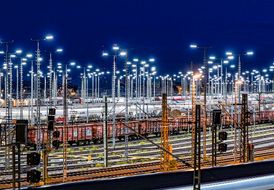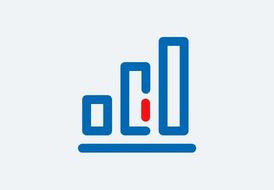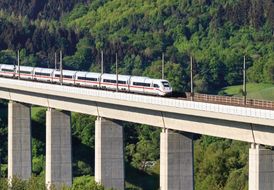Development in the year under review
- Performance development at the beginning of the year still significantly influenced by Covid-19 effects.
- Revenue decline, partially mitigated through government support payments.
- Cessation of the Rail North franchise (ARN effect).
DB ARRIVA | 2021 | 2020 | Change | 2019 | ||
absolute | % | |||||
Punctuality (rail) (United Kingdom, Denmark, Sweden, | 93.5 | 92.3 | +1.2 | – | 87.6 | |
Customer satisfaction for bus and rail in the United Kingdom (SI) | 77 | 80 | –3 | – | 78 | |
Passengers in bus and rail (millions) | 1,308 | 1,179 | +129 | +10.9 | 2,214 | |
Volume sold (rail) (million pkm) | 4,663 | 4,494 | +169 | +3.8 | 12,617 | |
Volume produced (bus) (million bus km) | 947.6 | 927.7 | +19.9 | +2.1 | 1,065 | |
Volume produced (rail) (million train-path km) | 109.2 | 111.3 | –2.1 | –1.9 | 168.9 | |
Total revenues (€ million) | 4,069 | 3,990 | +79 | +2.0 | 5,410 | |
External revenues (€ million) | 4,067 | 3,988 | +79 | +2.0 | 5,405 | |
EBITDA adjusted (€ million) | 359 | 51 | +308 | – | 752 | |
EBIT adjusted (€ million) | –73 | –431 | +358 | –83.1 | 289 | |
Gross capital expenditures (€ million) | 267 | 457 | –190 | –41.6 | 718 | |
Employees as of Dec 31 (FTE) | 43,189 | 46,008 | –2,819 | –6.1 | 52,331 | |
Annual average employees (FTE) | 44,187 | 47,180 | –2,993 | –6.3 | 52,855 | |
Employee satisfaction (SI) | – | 3.8 | – | – | – | |
Share of women as of Dec 31 (%) | 13.6 | 14.7 | –1.1 | – | 14.9 | |
Specific greenhouse gas emissions (rail) compared to 2006 (based on rail car units) (%) | –17.3 | –12.2 | –5.1 | – | –9.7 | |
Specific greenhouse gas emissions (bus) compared to 2006 (based on bus km) (%) | –14.9 | –16.2 | +1.3 | – | –10.1 | |
1) Change of methods in the UK Trains line of business in 2021 with retroactive adjustment in previous years.
Punctuality in rail passenger transport increased, partly as a result of the Rail North effect and due to the reduced standing times at stations due to the lower passenger numbers.
In the UK the customer satisfaction survey was paused due to the Covid-19 pandemic and was only resumed in the fourth quarter of 2021. DB Arriva’s activities achieved good results, with Arriva London Overground and Chiltern Railways in particular showing good improvements in over-all customer satisfaction. Customer satisfaction at UK Bus fell slightly as a result of lower supply due to Covid-19 and reduced punctuality.
The performance development recovered only slowly and remained at a low level. Overall, recovery effects and new traffic led to an increase in the number of passengers (bus and rail). Offsetting effects resulted from the Covid-19 pandemic, especially at the beginning of 2021, and the ARN effect. Thus, the volume produced in rail transport declined.
The economic development improved, mainly as a result of additional government support measures, but remains strained.
Overall, income development was slightly positive:
- Revenue increased, due in part to government support services, new transport services, recovering effects in Mainland Europe and due to exchange rate effects. The ARN effect and the effects of Covid-19, especially in the UK, countered this impact.
- Other operating income (+8.8%/€ +35 million) increased as well. Higher Covid-19-related government support measures and positive exchange rate effects were partially offset by the ARN effect.
On the expense side, there was a noticeable decline:
- Other operating expenses (–30.1%/€ –242 million) decreased significantly, due in part to the ARN effect and lower franchise payments. Exchange rate effects had a countereffect.
- Depreciation (–10.4%/€ –50 million) decreased as a result of one-off effects and due to the ARN effect. This was counteracted by an increase due to new traffic in Mainland Europe and exchange rate effects.
The increase in other expense items had a partially compensating effect:
- The increase in personnel expenses (+1.4%/€ +30 million) resulted mainly from exchange rate effects and one-off effects from the closure of pension plans, partially offset by the ARN effect. Adjusted for exchange rate effects, personnel expenses fell slightly.
- The increase in the cost of materials (+1.0%/€ +15 million) is also largely due to exchange rate effects and increased energy and maintenance costs. The ARN effect had a dampening effect.
DB Arriva took a cautious approach to capital expenditure activities, which subsequently declined significantly. The ARN effect and the conclusion of projects for new transport services in Mainland Europe also contributed to this.
The number of employees decreased as a result of the reduced volume of services and driver turnover at UK Bus.
The share of women decreased slightly.
Specific CO₂ emissions in relation to the reference year 2006 continued to decline in rail transport. The level in bus transport has deteriorated slightly. Telematics system support is a significant lever for reducing emissions, as it reduces heavy acceleration and braking processes in both bus and rail transport. The increasing share of Euro VI engines is making the bus fleet increasingly efficient and more environmentally friendly.
- Recovery has begun, Covid-19 effects persist.
- Further government support measures.
| UK BUS LINE OF BUSINESS | 2021 | 2020 | Change | 2019 | ||
absolute | % | |||||
Passengers (million) | 402.3 | 366.9 | +35.4 | +9.6 | 716.5 | |
Volume produced (million bus km) | 304.9 | 298.0 | +6.9 | +2.3 | 345.9 | |
Total revenues (€ million) | 861 | 838 | +23 | +2.7 | 1,076 | |
External revenues (€ million) | 861 | 837 | +24 | +2.9 | 1,074 | |
EBITDA adjusted (€ million) | 48 | 29 | +19 | +65.5 | 134 | |
EBIT adjusted (€ million) | –48 | –69 | +21 | –30.4 | 44 | |
Gross capital expenditures (€ million) | 50 | 36 | +14 | +38.9 | 64 | |
Employees as of Dec 31 (FTE) | 13,398 | 14,806 | –1,408 | –9.5 | 15,130 | |
The number of passengers at UK Bus increased due to Covid-19 recovering effects. After a decline in demand at the beginning of 2021, demand has recovered since March. It should be noted that the first months of 2020 were not yet impacted by Covid-19 effects.
Volume produced increased again, as fewer transport services were cancelled due to the Covid-19 pandemic.
The economic development was better. Increasing revenues and higher levels of support led to an improvement in operating profit figures.
Income development was slightly positive:
- Revenue development improved, mainly driven by exchange rate effects and the recovery in demand. The discontinuation of the bus sales and hire business of Arriva Bus and Coach had a dampening effect.
- Other operating income also increased, mainly as a result of higher Covid-19 support measures such as state bus service support grants as well as positive exchange rate effects.
On the expense side, negative exchange rate effects, among other things, led to an increase:
- Personnel expenses increased. Negative exchange rate effects and one-off effects from the closure of pension plans were partially offset by lower driver costs due to the effects of Covid-19.
- Other operating expenses increased, mainly due to exchange rate effects. After adjusting for these effects, other operating expenses remained virtually unchanged.
In contrast, the decline in other expense items had a partially compensating effect:
- Cost of materials decreased mainly due to lower expenses in connection with the discontinuation of bus sales and hire business of Arriva Bus and Coach. This was partly offset by negative exchange rate effects.
- Depreciation increased slightly as a result of lower capital expenditures in the previous year.
- Capital expenditures increased due to vehicle projects that were postponed in the previous year because of the Covid-19 pandemic.
The number of employees fell noticeably, due in part to driver turnover as a result of Brexit and the reduced service offering due to the Covid-19 pandemic.
- Continued negative effects due to Covid-19, mitigated by government support measures.
- Services of Grand Central temporarily suspended until March 2021 during the shutdown.
- Cessation of the ARN franchise on March 1, 2020.
| UK TRAINS LINE OF BUSINESS | 2021 | 2020 | Change | 2019 | ||
absolute | % | |||||
Passengers (million) | 118.6 | 120.5 | –1.9 | –1.6 | 354.8 | |
Volume sold (million pkm) | 2,863 | 2,943 | –80 | –2.7 | 10,264 | |
Volume produced (million train-path km) | 48.0 | 57.7 | –9.7 | –16.8 | 115.8 | |
Total revenues (€ million) | 1,141 | 1,286 | –145 | –11.3 | 2,190 | |
External revenues (€ million) | 1,107 | 1,255 | –148 | –11.8 | 2,137 | |
EBITDA adjusted (€ million) | 34 | 38 | –4 | –10.5 | 220 | |
EBIT adjusted (€ million) | 0 | –36 | +36 | – | 80 | |
Gross capital expenditures (€ million) | 6 | 47 | –41 | –87.2 | 277 | |
Employees as of Dec 31 (FTE) | 4,844 | 4,948 | –104 | –2.1 | 11,215 | |
The performance development at UK Trains was influenced by the ARN effect. It should also be noted that the start of 2020 was not affected by the Covid-19 pandemic.
The economic development continued to be shaped by Covid-19 effects. Operating profit figures improved due to the significant decline in expenses.
The income situation was significantly weaker:
- Revenues fell sharply, due in part to the ARN effect and the decline in passenger numbers. Government Covid-19 support measures and positive exchange rate effects partially compensated for this.
- Other operating income also declined sharply, due in part to the ARN effect.
On the expenses side, the ARN effect and changes in the treatment of leasing expenses at CrossCountry led to a significant decline:
- Other operating expenses fell significantly, mainly as a result of the ARNeffect, lower franchise payments due to government support, reduced rental expenses due to the changed treatment of leased assets at CrossCountry, and the loss of a negative one-time effect at Grand Central.
- The decrease in personnel expenses resulted mainly from the ARN effect, partially compensated by exchange rate effects.
- Cost of materials also fell significantly, mainly due to the ARN effect. Negative exchange rate effects had a partially offsetting effect.
- Depreciation fell significantly, primarily due to the ARNeffect as well as change in accounting treatment of lease assets at Chiltern Railways.
Capital expenditures fell significantly, primarily due to the ARN effect. In addition, capital expenditures of so-called emergency recovery measures agreements (ERMA) are generally grant-funded.
The number of employees fell slightly.
- Recovery has begun, Covid-19 effects persist.
- Further government support measures.
- New transport services in the Czech Republic with positive effect.
| MAINLAND EUROPE LINE OF BUSINESS | 2021 | 2020 | Change | 2019 | ||
absolute | % | |||||
Passengers (bus) (million) | 696.0 | 610.2 | +85.8 | +14.1 | 1,018 | |
Passengers (rail) (million) | 91.2 | 81.5 | +9.7 | +11.9 | 125.4 | |
Volume sold (rail) (million pkm) | 1,800 | 1,551 | +249 | +16.1 | 2,353 | |
Volume produced (bus) (million bus km) | 642.7 | 629.7 | +13.0 | +2.1 | 719.5 | |
Volume produced (rail) | 61.2 | 53.6 | +7.6 | +14.2 | 53.2 | |
Total revenues (€ million) | 2,258 | 2,034 | +224 | +11.0 | 2,321 | |
External revenues (€ million) | 2,098 | 1,894 | +204 | +10.8 | 2,182 | |
EBITDA adjusted (€ million) | 340 | 50 | +290 | – | 402 | |
EBIT adjusted (€ million) | 44 | –220 | +264 | –120 | 174 | |
Gross capital expenditures (€ million) | 210 | 370 | –160 | –43.2 | 377 | |
Employees as of Dec 31 (FTE) | 24,585 | 25,897 | –1,312 | –5.1 | 25,572 | |
The performance development in Mainland Europe was positive overall, driven by new transport services and a recovery in demand, as well as the sustained Covid-19 effects, particularly at the beginning of the year:
- In rail transport the effects from new traffic in the Czech Republic and recovery effects exceeded the Covid-19-related declines.
- In bus transport, the development was regionally differentiated. The Covid-19 impact varied by region, depending on the extent of the restrictions. Overall, the number of passengers and the volume produced increased, mainly driven by partial Covid-19 recovery and new transport services in the Czech Republic and in Italy.
The economic development was much more positive again, driven by a noticeable growth in income:
- The significant increase in revenues resulted mainly from the partial recovery in demand and new transport services in the Czech Republic. Exchange rate effects also had an impact.
The expense side was significantly influenced by the omission of Covid-19-related effects:
- Other operating expenses fell significantly, primarily due to lower effects of creation of provisions for impending losses, which were exceptionally high in 2020 due to the Covid-19 pandemic.
The increase in other expenses was partly compensating:
- The increase in costs of materials was driven in particular by higher fuel costs as a result of the expansion of services. In addition, new transport services in the Czech Republic also contributed to higher expenses.
- Depreciation increased significantly, mainly due to capital expenditures for new transport services in the Czech Republic and the impairments on diesel buses in connection with the EU Directive on the Promotion of Clean and Energy-Efficient Road Transport Vehicles.
- Personnel expenses increased as a result of the expansion of services and exchange rate effects.
The decline in capital expenditures also resulted from the conclusion of capital expenditure measures for new transport services.
The number of employees fell due to delays in the reemployment of temporary staff after the Covid-19 pandemic and the impact of strategic decisions in non-core countries.
The revenue structure changed only slightly, due in part to the effects of new transport services in the Czech Republic. The share of revenue in Spain also increased, while the share in the Netherlands declined.



